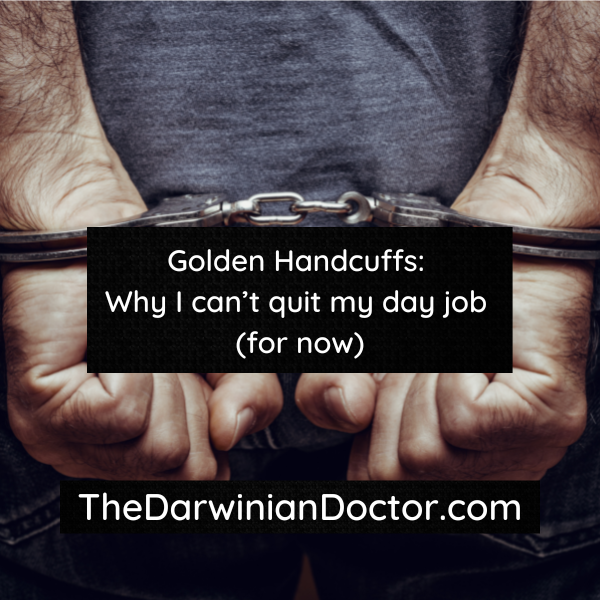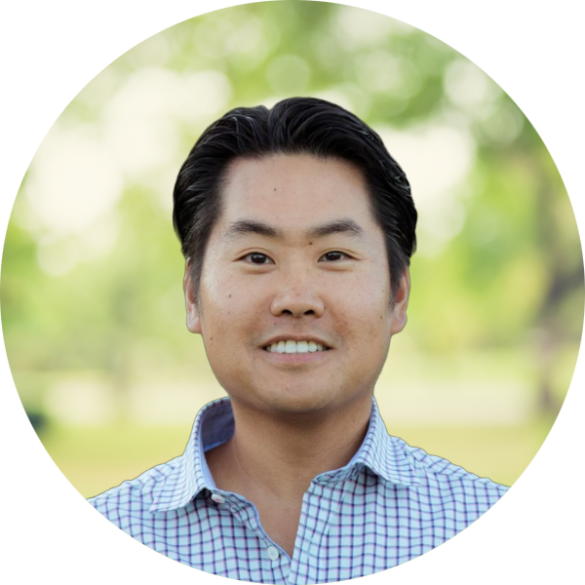Today’s post is about my “golden handcuffs,” and how they keep me working or commuting 65 hours a week, whether I like it or not.

This post may contain affiliate links.
What are “golden handcuffs”?
“Golden handcuffs” is a term given to a well-paying job that you’re forced to keep because you are dependent on the income or perks of that job.
A great example is a pharmacist who is paid quite well, but ideally would love to work less or even change careers entirely. Changing careers seems impossible, however, due to high expenses. The income or benefits from these “golden handcuff” jobs are high (hence the term “golden”), but they are handcuffs nonetheless.
As you’ll see in my next post, my month to month expenses are really high. Luckily, working as a surgeon pays well and my wife also works full time, so I’m able to meet these financial obligations. But my job usually takes up over 65 hours of my week between the work hours and my commute.
Ideally, I’d love to work less and have more time to spend with my kids or pursuing other interests and projects like writing and real estate. But I don’t feel that I can cut back on my work hours because of my high expenditures. I definitely feel the daily weight of heavy golden handcuffs.
The commute isn’t all bad
One upside to my the long daily commute for my job has been the opportunity to listen to an endless stream of podcasts on financial independence and investing.
To me, financial independence means being in the position to cover one’s day to day expenses with proceeds from assets, rather than one’s day job. An “asset” is a rather vague term, but in the parlance of Robert Kiyosaki, author of Rich Dad Poor Dad, this can be simply defined as something that puts money into your pocket rather than takes money out of your pocket each month. (Think dividend generating stocks versus a sports car.)
While there is disagreement about the best way to achieve financial independence, most though leaders seem to agree that the best starting point is a good understanding of one’s own financial situation. On the most basic level, this means a budget. The next level would be an analysis of one’s savings, liabilities, and assets. The final level would include a thoughtful analysis of one’s short and long term goals, and reflection about one’s risk tolerance. This would all generate a plan and timeline to financial independence.
I definitely have heavy golden handcuffs
I knew that I had golden handcuffs, but I didn’t really appreciate the weight of these handcuffs until the Darwinian Dr-ess (aka wife) and I spent some serious spreadsheet time to gain a very detailed understanding of our cash flow. It’s been an eye opening process and has also been an overall positive force in our marriage. We now are unified in our goal to eventually free ourselves from this self-imposed financial prison that we’ve created for ourselves through lifestyle inflation and the way we’ve chosen to raise our kids. With careful planning, discipline, and investment, we plan to become financially independent within the next 15 years. (Update: Lately, I’ve accelerated the timeline to financial independence using rental real estate. Read about this journey here.)
As a disclaimer, I live in an area of the country with a very high cost of living. Though these dollar levels might seem very high, they reflect fairly typical costs for Southern California. I hope this deep dive will be interesting and useful to you!
The next post is going to show you exactly what is keeping us handcuffed to our jobs:
The Darwinian Doctor’s 13 Monthly Expenditures (with real numbers)
— TDD
Want to support the blog?
- Join our investor club at Cereus Real Estate
- Visit my Recommendations page
- Check out my wife’s food blog: Eat Dessert First
- Stay at our luxury short term rentals
- Check out my TikTok channel
- Follow me on Instagram
- Follow me on YouTube
- Contact me with questions







2 comments
which podcasts do you prefer and which ones specifically have helped you learn about real estate investing?
Hey DrJ — this is a good reminder that I should make a recommendations page. In the works!
My favorite real estate focused podcasts right now include:
>> Get rich education (if you can get beyond the podcaster’s odd inflection, there’s really good content here)
>> Afford Anything (Ignore the earlier podcasts, they get much, much better)
>> Bigger Pockets Money (financial independence with a strong real estate focus)
I’ll have to do a more well thought out post on this topic!
Enjoy,
— TDD